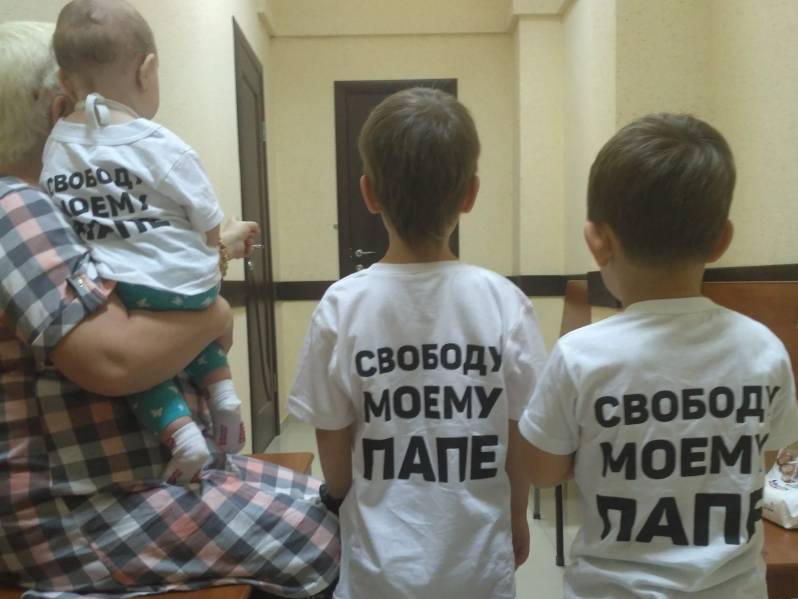• Topics / Human Rights Abuses in Russian-occupied Crimea
Russia fights Crimean Solidarity with long prison sentences and shattered childhoods

Said Asanov had always wanted to be an architect when he grew up. Until October 11, 2017, when his childhood ended with the arrival of masked men brandishing machine guns who took his father away. Now he plans to become a lawyer “to help people and to defend the innocent”.
11 October 2017 was a dark day for Said’s family, and those of the five other Crimean Tatars from Bakhchysarai arrested on gravely flawed charges. It also marked a serious escalation in Russia’s offensive against Crimean Solidarity. This civic initiative arose after the arrests in February 2016 of human rights activist Emir-Usein Kuku and three other Crimean Muslims, and has played an invaluable role in giving support to political prisoners and their families, as well as providing vital information about the mounting number of armed searches and arrests. Such peaceful solidarity is clearly not to Russia’s liking and it had for quite some time used other methods, including administrative prosecution, against Crimean Solidarity activists.
Seiran Saliev, for example, had faced administrative prosecution and a 20 thousand rouble fine in August 2016 for having used the Mosque loudspeaker to warn Bakhchysarai residents that armed searches were underway of the homes of four Crimean Tatars on 12 May that year. This was claimed to have been ‘an unauthorized demonstration’. In January 2017, Saliev was jailed for 11 days over a pre-annexation social media post about a meeting of the Hizb ut-Tahrir organization which is legal in Ukraine, but which Russia has banned. Prominent lawyer Emil Kurbedinov was detained while travelling to Saliev’s home, where a search was underway, and also, with particularly chilling cynicism, jailed for 10 days. Less than a month later, on 21 February 2017, 10 Crimean Tatars who gathered outside the home of Crimean Tatar activist Marlen Mustafaev where a search was taking place and reported Mustafaev’s arrest on social media, were themselves detained and jailed for five days.
Saliev was one of the six men, almost all of them activists from Crimean Solidarity, who was arrested, after armed searches that found nothing but some religious literature, on 11 October last year.
This time, the charges, albeit surreal, could not be more serious given the likely sentences and the conveyor belt nature of such ‘Hizb ut-Tahrir trials’. Russia’s Supreme Court has never explained why it declared an organization not known to have committed any act of terrorism or violence anywhere in the world ‘terrorist’. The prosecution in such ‘trials’ do not need to prove that the defendants committed an act of terrorism, or even, in fact, that they committed a crime at all. The charges in all these cases are based solely on the allegation that the men are involved in Hizb ut-Tahrir, with the ‘evidence’ for such involvement provided by ‘secret witnesses’ or questionable ‘expert assessments’ of comments on religious, political or social issues.
Of the six men arrested on 11 October 2017, Suleyman (Marlen) Asanov has been designated the role of ‘organizer’ of a Hizb ut-Tahrir ‘cell’ (under Article 205.5 § 1 of Russia’s criminal code), with this carrying a sentence of up to life imprisonment. The other five men: Ernest Ametov; Memet Belyalov; Timur Ibragimov; Saliev and Server Zekeryaev are accused of ‘involvement’ in this (under Article 205.5 § 2 – from 10 to 20 years’ imprisonment).
In December 2017, Asanov was named Ukraine’s Volunteer of the Year. By profession, a teacher of Crimean Tatar Language and Literature, Asanov opened and ran the Salachik Cultural and Ethnographic Café in Bakhchysarai, and is a well-known and much respected member of the community who never stood by when people needed help. Asanov became a very active member of Crimean Solidarity, and would buy medicine or clothes for the children of political prisoners, pay for operations, etc. Meryem Kuku, wife of the imprisoned human rights activist, recalls how Asanov and Timur Ibragimov came to her to check whether she needed any help with heating, with repairs to the home, whether the couple’s two children had everything needed for the approaching winter.
In one way or another, all of the men, except possibly Ametov, were actively involved in Crimean Solidarity. All are devout Muslims, educated men who played an active role in their children’s upbringing, as well as in helping others in need.
Any faint flicker of doubt that this was a systematic attack on Crimean Solidarity was dispelled on 21 May 2018 with the arrest of Server Mustafaev, one of the coordinators of Crimean Solidarity and Edem Smailov who has also been involved in the civic initiative. They are now also facing charges in this same ‘Hizb ut-Tahrir case’.
Another Bakhchysarai Crimean Solidarity activist and civic journalist Nariman Memedeminov has been in custody since 22 March 2018. He is charged solely in connection with absolutely innocuous videos posted on YouTube in 2013, well before annexation. In the videos in question he condemns Russia for persecuting Muslims and expresses his views about the revival of the Khalifate. The FSB are claiming that this falls under Article 205.2 § 2 of Russia’s criminal code –‘public calls to carry out terrorist activities, public justification of terrorism or propaganda of terrorism’.
In each one of these cases, large contingents of masked men in camouflage gear flourishing automatic rifles have burst their way into homes where young children were asleep, often using totally unnecessary force against men who have never committed any wrongdoing and deeply traumatizing their children.





